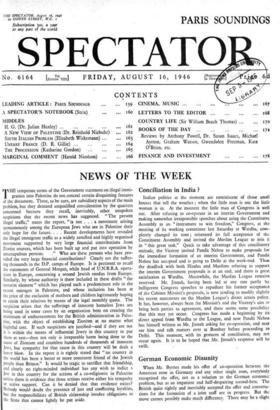Conciliation in India ?
Indian politics at the moment are reminiscent of those small houses that tell the weather ; when the little man is out the little woman is in. At the moment the little man of Congress is well out. After refusing to co-operate in an interim Government and making somewhat irresponsible speeches about using the Constituent Assembly as an "instrument to win freedom," Congress, at the meeting of its working committee last Saturday at Wardha, com- pletely changed its tone ; reiterated its full acceptance of the Constituent Assembly and invited the Muslim League to join it in "this great task." Quick to take advantage of this conciliatory attitude, the Viceroy invited Pandit Nehru to make proposals for the immediate formation of an interim Government, and Pandit Nehru has accepted and is going to Delhi at the week-end. Thu.; the deadlock with both Hindus and Muslims refusing to support the interim Government proposals is at an end, and there is great satisfaction at Wardha. Meanwhile, the Muslim League remains reserved. Mr. Jinnah, having been led at any rate partly by belligerent Congress speeches to repudiate his former acceptance of the Cabinet Mission's proposals, is now tending to modify slightly his recent statements on the Muslim League's direct action policy. It has, however, always been the Mission's and the Viceroy's aim to bring both parties to agreement, and there seems some possibility that this may yet occur. Congress has made a beginning by its direct appeal from Wardha to the League, and now Pandit Nehru has himself written to Mr. Jinnah asking for co-operation, and may see him and talk matters over at Bombay before proceeding to Delhi. This moment, with its gestures of conciliation, may not occur again. It is to be hoped that Mr. Jinnah's response will be swift.


























